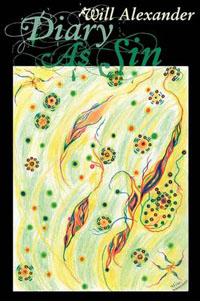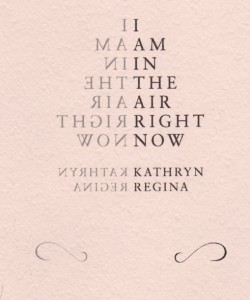Diary As Sin by Will Alexander
 Diary As Sin
Diary As Sin
by Will Alexander
Skylight Press, 2011
172 pages / $18 Buy from Amazon
I. RAINBOW VORTEX OF THE ANIMATED BREATH
The Ancients, who believed in their dreams, believed in the meaning of their dreams, they did not believe in the forms they took. Behind their dreams and at varying levels, the Ancients sensed forces, and they immersed themselves in these forces. They had an overpowering sense of the presence of these forces, and they sought throughout their entire organism, if necessary by means of a real vertigo, the means of remaining in contact with the release of these forces.
– Antonin Artaud, “Man Against Destiny”
I think of myself, the poet sending signals into mystery, and having them return to me with oneiric wings and spirals, so much so, that I forget my prosaic locale with its stultifying anchors, with its familial dotage and image reports, with its dates inscribed in trapezoidal feces. I am only concerned with simultaneity and height, with rays of monomial kindling, guiding the neo-cortex through ravens, into the ecstasy of x-rays and blackness.
– Will Alexander, “On Anti-Biography”
READ MORE >
September 23rd, 2011 / 12:00 pm
The Adventures of Bluey and the Childhood Writings of Paul Bowles
“Drugs, bigamy, desertion, lawsuits, the plague: these are hardly the elements one expects to find in the writings of a nine year old.”
—Christopher Sawyer-Lauçanno, biographer of Paul Bowles
When Paul Bowles was 9 years old, he created a diary that documented the adventures and pitfalls of imaginary characters who went on wild journeys and were continually surrounded by death, disease, chaos, and crisis—all of which were conveyed by little Paul in a tone that is eerily mute, terse, and affectively stunted while also being intellectually sophisticated and highly developed in terms of narrative. The 3rd person diary entries have a strange and disturbing quality to them—we immediately pick up on Paul’s obsessive preoccupation with names (characters, places), numbers, measurements, etc. In the entries, Paul invented, among other things, a drug called “postage hypodermic” and a plague called the “Green Horror” (“Marshelle gets Green Horror. Marshelle dies of Green Horror…. Dukol Whitman dies of Green Horror….”). We also get a sense of the way he was trying to emulate the adult world and—in doing so—revealed its utter absurdity. I can’t get over how evocative and fascinating Paul’s childhood writings are—and to think that he had to pen them in secrecy, fearing the disapproval of his father, who once beat him and took his journals away for 2 months when he was caught scribbling.
Below the cut is a brief excerpt from Paul’s childhood narrative, which consists of over 450 entries in total. This particular passage, which was published by surrealist literary magazine View, deals with the mishaps of Bluey Laber Dozlen, who travels to Wen Kroy (“New York” spelled backward) from an unknown European city.
READ MORE >
Surrealism case studies: video game glitches
I’m fascinated with video game glitches, especially in POV games, given their inherent ‘narrative’ orientation. What makes video games so evocative is the pristine artifice and utilitarian rendering; and when transgressed by a coding glitch, is very unsettling. I find the inadvertent surrealism in the clips below uncanny, humorous, and ‘anti-brilliant.’ It begs the question: if accidents are where the really good ideas are — full of, strangely, more ‘natural’ logic — then what the hell is a writer supposed to do?
Case No. 1:
httpv://www.youtube.com/watch?v=VK9lS0rE0uY&feature=related


 Kathryn Regina’s I am in the air right now (see publisher details
Kathryn Regina’s I am in the air right now (see publisher details